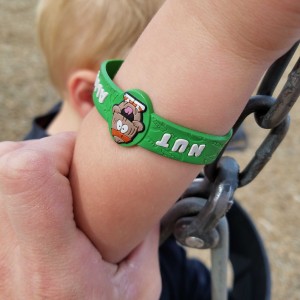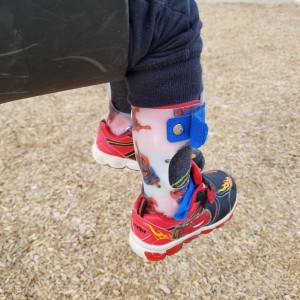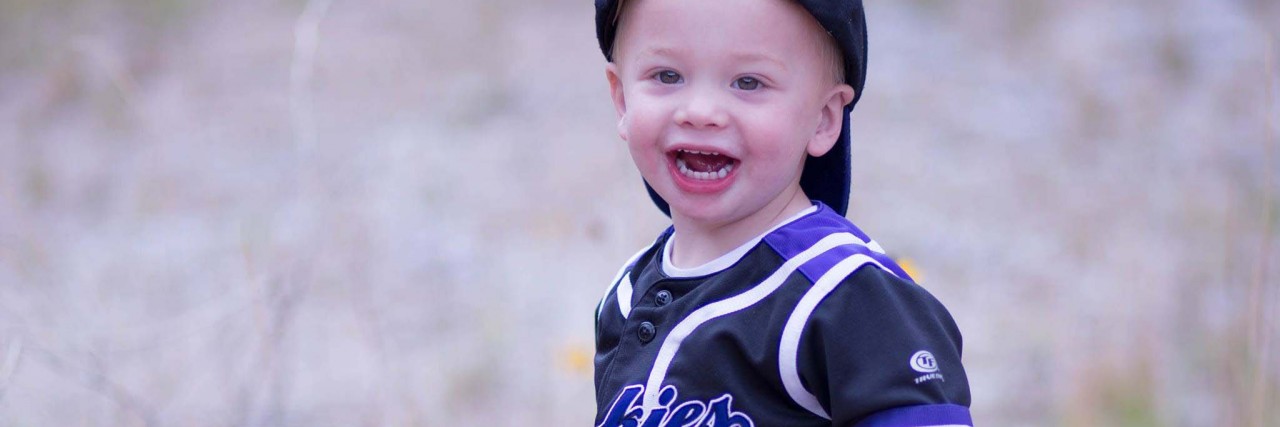When My Son's Disabilities Bring Out the Best and Worst in People

|
 |
One of these pictures tends to elicit kindness and compassion from people in my community and on the Internet. The other photo seems to bring out the worst in those same people. The irony is that both show the same child, just two different disabilities.
At just over a year old, my now-2-year-old son was diagnosed with a peanut allergy. Just like that, everyday places like the park became life-threatening. Shortly after his diagnosis, I posted a question on my town’s Facebook page: “Does our town have a peanut free school?” We live in a school choice state, so it was possible that at least one of the three elementary schools in our town was completely nut free.
Despite being a yes or no question, my post accumulated nearly 300 comments from community members. Many were entirely negative. I was told I should home school my son because of his allergy. I was also told “How dare you claim his food allergy is a disability,” after explaining that my son has a right to “free and appropriate education” under the Americans With Disabilities Act. (Food allergies are considered a disability under the ADA.) On a different Facebook post, some Internet stranger implied I should allow my child to die by telling me “You should just allow natural selection to do its job,” so his child could bring a peanut butter sandwich to school. He clearly doesn’t understand what natural selection means.
Another parent recently posted a video explaining the Teal Pumpkin Project to our town’s Facebook page. While many people were supportive of the initiative, some people took offense to it, proclaiming “the world isn’t fair” and “these kids just need to suck it up and deal with [not being able to trick or treat].” One woman took offense to using the holiday to create awareness, stating “This isn’t what holidays are about.”
I also posted a reminder at the beginning of summer, asking people if they chose to bring peanut products to the park, could they please eat them at the picnic tables and not near the equipment. I was told I should not bring my child to the park. The amount of cruelty I see on a daily basis regarding food allergies is astounding. The fact that someone would wish my child dead just so theirs could bring a peanut butter sandwich to school is appalling.
Shortly after turning 2, my son was diagnosed with a Chiari I malformation. A part of his brain called the cerebral tonsils is being pushed out of his skull, causing a variety of symptoms. He will most likely need to have a decompression surgery within the next 1-2 years. Around the same time, my son was fitted for his first set of ankle-foot orthotics, AFOs. The cause of his spasticity, toe walking, and gait issues is unknown at this time. What we do know is that the braces have helped him tremendously.
Like any 2-year-old, my son loves the park. The park closest to us is the community center park. He is also obsessed with swings. The community center park only has big kid swings and baby swings. Once he got his braces, it became extremely difficult to get him into and out of the baby swings. I once again posted a question to my town’s Facebook page asking if anyone knew of any grants for special needs playground equipment. I explained my son recently got leg braces and it was a challenge to use the swings. People in my community were extremely helpful with getting me in contact with someone at the rec center. Other people said they would help with a Kickstarter campaign if needed because the park “should be accessible for all children.”
The kindness was overwhelming and greatly appreciated. Yet the irony of it all had me laughing. Just months prior, I was told by members of the same community that I should keep my child home from the park due to his peanut allergy disability. Now this community is telling me that the park should be accessible for all. I don’t believe anyone made the connection that it was the same child they had vilified in the past.
As a society, we have come a long way with regards to how we treat individuals with disabilities, especially children. It is apparent however, that the kindness and compassion sometimes only seem to extend to children whose disabilities can be seen. The Universe has presented my child with two uniquely challenging disabilities. One brings out the best in our community. The other brings out the worst. When I look at him, though, I don’t see a child with disabilities. I see my child. A child who deserves to be treated with kindness in all aspects of his life. It is my hope that one day my community will see it, too.
We want to hear your story. Become a Mighty contributor here.

